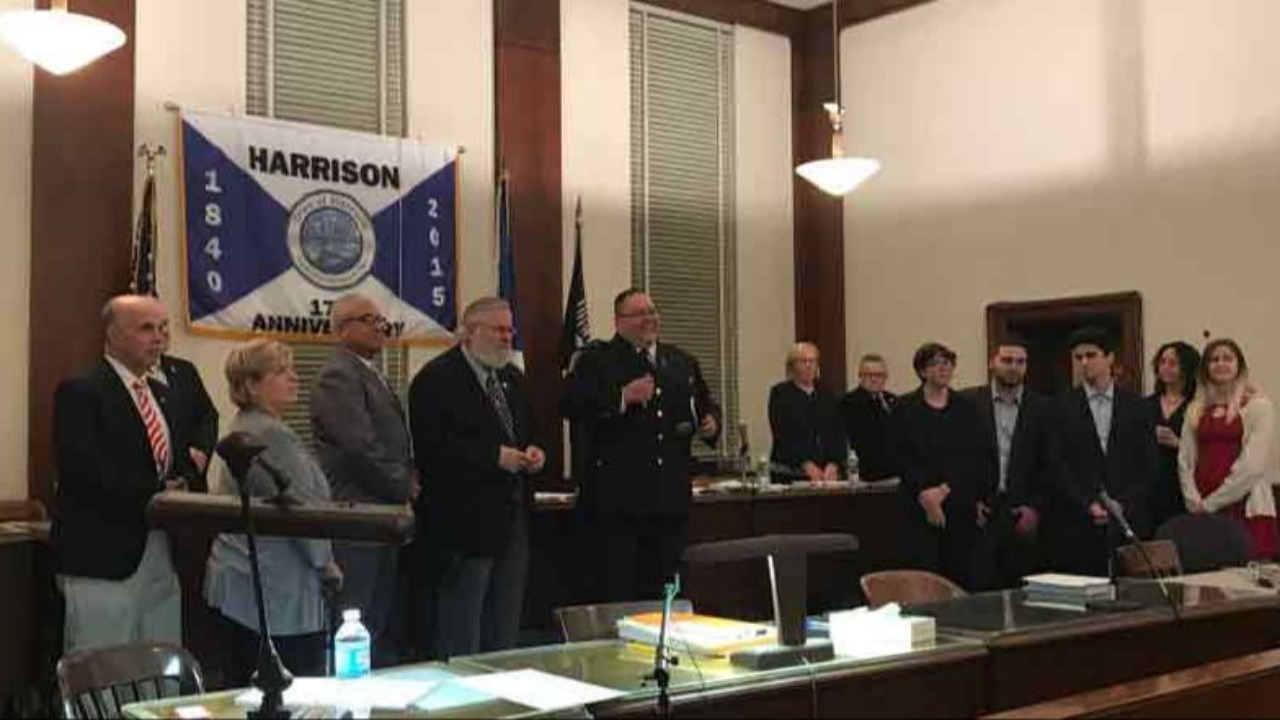Mayor & Council Quietly Moving To Add Police Director Position
Apr 09, 2025
Without public notice or inclusion on the original agenda, the Harrison Mayor & Council introduced an ordinance at their most recent meeting on April 1, 2025, to amend the Police Department’s Table of Organization by adding the position of Police Director, a civilian role with a proposed salary range of $50,000 to $180,000. The ordinance, which seeks to amend Section 1 of Ordinance Number 1253, marks a significant shift in the leadership structure of the Harrison Police Department, raising questions about transparency and the intent behind the change.
The proposed ordinance was not listed on the published agenda for the April 1st meeting nor was it formally announced as an addition by the Town Clerk at the start of the session. Its existence came to light only when a member of the public inquired during the public comment portion whether any items had been added to the agenda since its publication on the Town website. In response, the Town Clerk confirmed the amendment had been added after the agenda was released, and stated that the official agenda posted on the Town’s website would be updated the next day to include the Police Director amendment.
The motivations behind the Fife Administration’s decision to amend the organizational structure of the Police Department remain unclear. Harrison Police Chief David Strumolo, currently the head of the department, reportedly referred our inquiry to Councilman James Doran, Chairman of the Police Committee. Councilman Doran has yet to provide an explanation as to why the new position is being introduced or whether it will supplant the role of the Police Chief.
Critics of the move argue that it reinforces the administration’s pattern of opaque governance. The failure to disclose such a consequential ordinance in advance has renewed concerns over transparency and public trust in local government.

Police Chief vs. Police Director: There Is A Difference
New Jersey municipalities are legally permitted to choose between appointing a Police Chief, who is a sworn law enforcement officer, or a Police Director, a civilian administrator, to head their departments. The choice has sparked extensive debate across the state, particularly surrounding issues of qualifications, authority, and community trust.
Police Chief:
- Qualifications: Typically promoted through the ranks, bringing decades of law enforcement experience.
- Authority: Possesses full police powers, including arrest authority and the right to carry a firearm.
- Strengths: Operational expertise, strong rapport with officers, and deep community ties.
- Challenges: Risk of internal bias or resistance to change, limited experience in civilian-style management.
Police Director:
- Qualifications: Often civilian professionals with backgrounds in administration or public policy.
- Authority: Lacks law enforcement powers; cannot arrest or carry a weapon.
- Strengths: Focus on efficiency, budgeting, strategic planning, and objective oversight.
- Challenges: May lack firsthand understanding of police operations and emergency decision-making capabilities.
A Growing Debate in Hudson County and Beyond
While Police Chiefs remain the norm across Hudson County, only two municipalities—Weehawken and West New York—have appointed a Police Director as the head of their police departments. The majority of departments, including Harrison, Kearny, Bayonne, Hoboken, and Jersey City, are still led by sworn Chiefs. Police Directors are seen as political appointees rather than merit-based Police Chiefs who come through the local police ranks.
The controversy surrounding civilian police leadership is not new. In August 2024, the Borough of East Newark considered eliminating its Police Chief position in favor of a civilian Director of Public Safety. Former Chief and sitting Councilman Kenneth Sheehan Sr. strongly opposed the change, citing concerns about law enforcement oversight and leadership integrity. His advocacy led the Borough Council to table the ordinance and eventually maintain the Police Chief role.
Legal Framework and Opposition
According to N.J.S.A. 40A:14-118, municipalities must formally establish their police department leadership through an ordinance. While the law permits the creation of Police Director positions, it also defines the Chief of Police as the official responsible for enforcing the rules and regulations of the department. The proposed amendment before the Mayor & Council designates the Police Committee of the Mayor & Council as the entity to enforce the rules and regulations of the department seemingly taking away the Chief of Police as the official responsible for enforcing the rules and regulations of the department.
Organizations such as the New Jersey State Association of Chiefs of Police (NJSACOP) have publicly opposed the appointment of civilian directors, warning that such moves can create confusion over authority and undermine the established chain of command in law enforcement. It also takes away the motivating possibility that a police officer can rise through the ranks to become the Police Chief.
What's Next for Harrison?

The introduction of a Police Director position in Harrison raises important questions:
- Will the new role co-exist with the current Chief of Police, or replace it?
- What specific administrative or political goals are driving this change?
- And perhaps most importantly, why was the public not notified in advance?
Residents, advocacy groups, and law enforcement officials will be watching closely as the Second Reading of the ordinance occurs at the next Mayor & Council meeting on Tuesday, April 15, 2025, with a 6:15 p.m. start at the Harrison Town Hall located at 318 Harrison Avenue, Harrison NJ. It is an opportunity for the Public to ask questions or raise in opposition to the proposed change. With public confidence already strained, the Fife Administration’s approach to police oversight may determine the tone of town politics heading into 2026.
As the ordinance awaits its second reading and potential adoption, the Harrison community deserves a clear and honest discussion about the future of its police leadership—and the transparency of its local government. Is it always a coincidence that an important Agenda item gets added on rather than placed in the original Agenda package?
Leave your thoughts about this article on our Community Discussion Board. If you haven't joined yet? Sign up now for free.

